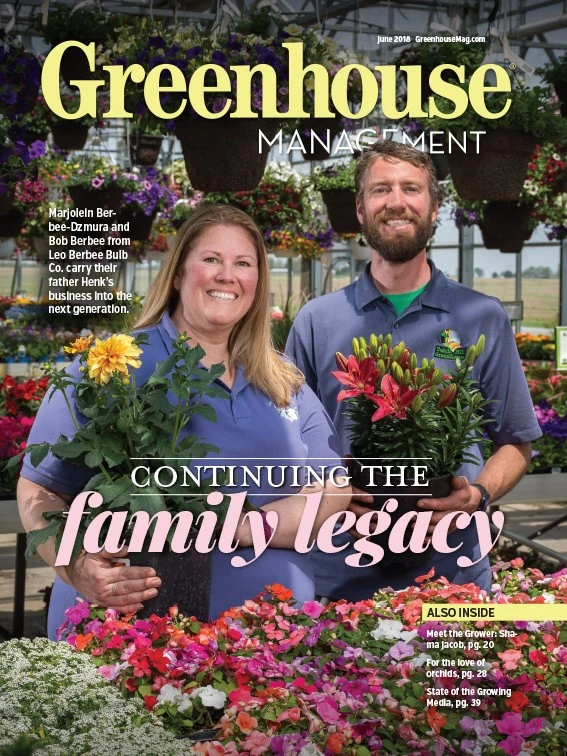
Shama Jacob always knew he’d end up in the greenhouse business. His parents worked at Jolly Farmer — a grower of young and finished plants — since before he was born, “so it was natural I would follow,” he says.
Jacob started working at the greenhouse in seventh grade — planting flats, hand-mixing soil and sweeping under benches. In his mid-teens, he began working on the dairy farm that Jolly Farmer operates, where he milked cows, hauled hay and cleaned pens. Later, Jacob began assisting in the greenhouse by cleaning and helping growers spray fungicides and growth regulators.
In 1997, when Jacob was 19, Jolly Farmer reorganized and relocated from East Lempster, New Hampshire, to New Brunswick, Canada. The ownership structure shifted, and the Jacob family — along with several other employees — became shareholders.
Jacob helped build the new facility, which he especially enjoyed because he “got to run heavy equipment like the excavator, backhoe, dump truck and bulldozer.” One of the projects included installing a large wood boiler in January 2000.
After that was installed, Jacob began training to become a grower at age 22.
“Not many people want to be growers, because it’s hard work and takes a high level of dedication,” says Jacob, who turns 40 this year. “But it’s an opportunity for a lifetime of learning. This business keeps you humble. You never know it all, and just when you think you do, you learn something new.”

Team leader
In his current role as lead grower, Jacob manages five head growers. Each head grower oversees a different crop group, roughly divided between seed and vegetative crops, and by temperature blocks.
“My job is keeping us all together, orchestrating the labor for all the teams, coordinating team training and dealing with personnel issues,” Jacob says.
For example, if a member of the growing team calls in sick during February or March, which is peak season, Jacob might spend the day caring for that grower’s houses. Other times, he might divvy that grower’s work up among others, so he can focus on his own projects, like documenting trials for seed companies. He also helps growers spray three days a week, and constantly works to improve quality by adjusting growth regulator schedules and plant care instructions.
“My team and I are caring for 29 greenhouses during peak season,” Jacob says. “Plugs require an extremely high level of detail. The cells are very small, the concentrations are very high, and we as a company have no minimum order on our plugs or cuttings — so the numbers per group, per species, per size can be very small — so it’s intense.”
In April, Jacob’s focus expands to include finished crops. “The groups are bigger, the variety selection is smaller, and you have a larger container, which is more forgiving for moisture, so it’s less intense,” he says, even though his team still oversees at least 25 greenhouses through May, when finished production peaks.

Growth spurt
Last summer, Jolly Farmer added 10 more 300-foot greenhouses, bringing its total to 3.8 acres of covered production space on a 12-acre facility. As of press time, Jolly Farmer planned to add another six greenhouses this spring to help accommodate the growth they’ve seen, as soon as the ground thawed.
“We’ve struggled for years to fit in 10 acres, so we decided to expand,” Jacob says, citing steady year-over-year growth in plugs, cuttings and finished crops. “After we completed the expansion, we acquired a company, which completely filled the new expansion.”
Last October, Jolly Farmer acquired Sweet Valley Herbs from a nearby gourmet chef and his wife who started growing herbs in 1997 to supply local restaurants. The acquisition added a lineup of more than 100 varieties of herbs to Jolly Farmer’s production, which already included a few potted herbs and patio vegetables.
Family support
Jacob’s parents and several other family members are also involved in the business. His dad does programming, and his mom handles mailing for the company’s 3,500 customers. His sister does payroll, and his brother is vice president of Jolly Farmer’s transport division, operating a fleet of about 20 trucks that cover every province in Canada and every state in the U.S. except Nevada. Two of his cousins are head growers, and another works in maintenance.
With 300 employees at peak season (including a growing staff of 27), Jolly Farmer celebrated its 50th anniversary last year. Because of the close-knit culture there, Jacob considers the whole team his extended family.
“As a team leader, one of my challenges is balancing the need for 24/7 plant care with the needs of my team,” Jacob says. “The rewards of a close-knit, caring team are amazing, because people who really like to work with you will do their best for you day-to-day.”

Explore the June 2018 Issue
Check out more from this issue and find your next story to read.
Latest from Greenhouse Management
- Anthura acquires Bromelia assets from Corn. Bak in Netherlands
- Top 10 stories for National Poinsettia Day
- Langendoen Mechanical hosts open house to showcase new greenhouse build
- Conor Foy joins EHR's national sales team
- Pantone announces its 2026 Color of the Year
- Syngenta granted federal registration for Trefinti nematicide/fungicide in ornamental market
- A legacy of influence
- HILA 2025 video highlights: John Gaydos of Proven Winners





